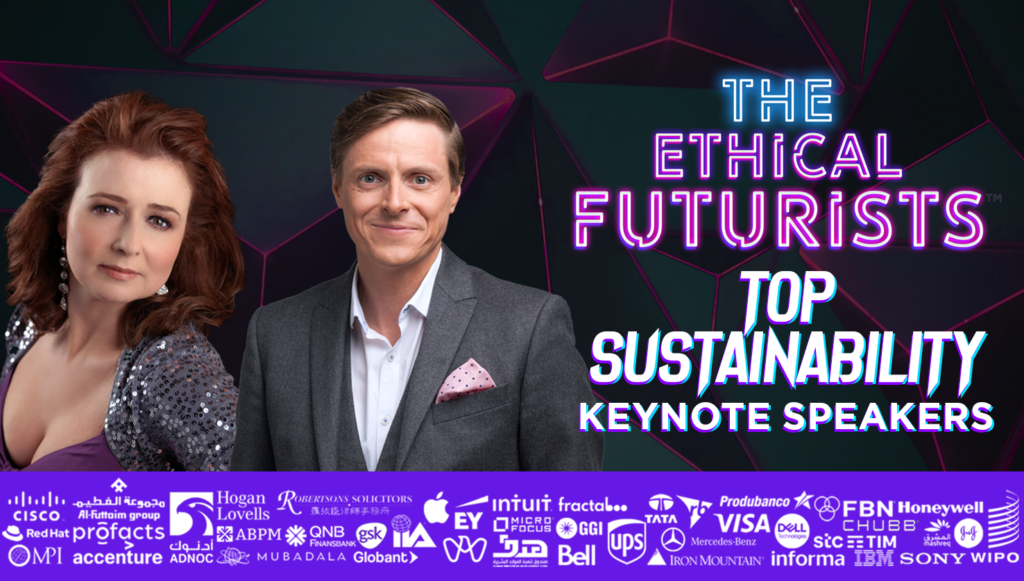With the effects of the climate crisis being felt across the world, we are at an important crossroads. The decisions we make today will greatly impact our future. As keynote speakers working internationally, The Ethical Futurists look to play their part as change-makers – using their voice to push for the changes needed to reduce the meeting, conference and events industry’s emissions and build a more sustainable future.
The Sustainability Rider is not about making demands. It is a tool to instigate creative collaboration and make the practical changes needed right now. It can and should be adapted based upon the speakers and client’s circumstances and to our ongoing discoveries about the challenges we face. The Sustainability Rider is about creating new norms and working together to reduce our environmental impact, from the waste created to the way we travel. Like all other industries, the events industry has much to do and The Ethical Futurists and their team are there to support you on your journey towards greater sustainability.
** If you are a fellow keynote speaker then feel free to adapt this sustainability rider and add it to your own speaking agreements. Every speaker and client is different so take what is useful and discard the rest.
This Rider forms part of the Agreement between the “Client”) and The Ethical Futurists (‘Speakers’) in relation to the event.
The parties agree that, notwithstanding any term to the contrary set forth in the Agreement, the following will be observed by all Production Staff and employees contracted on the Project:
1. Travel/Accommodation
The Speakers will undertake to:
a. Consider the environmental cost of any transport and accommodation requests and reduce accordingly, avoiding high impact choices such as large trailers, private air travel, or fossil-fuel powered road vehicles.
b. Take trains, not planes in the UK and Europe where practicably possible. Where a feasible route is not available, or there are time restrictions, access needs or security constraints, alternatives will be negotiated at the Client and Speaker’s discretion, keeping emission reduction in mind.
c. Where flying is unavoidable, the Speakers and Client will negotiate other ways to reduce emissions. (e.g. flying economy class on shorter routes, or lower emission airlines)
d. Participate in car shares with other Speakers where practical to reduce travel emissions.
The Client Will Undertake to:
e. Provide low carbon transport options (e.g. trains, electric vehicles) for the Speakers. If this is not offered, a valid explanation must be offered to the Speaker.
f. Schedule recovery time for the Speakers where travel is longer than 8 hours.
g. Provide information about the carbon cost of different transport and accommodation options to allow the Speaker to make informed low carbon/sustainable choices (e.g. predicted emissions of flights, hotel sustainability ratings).
h. Subsidise the Speakers to make their own way to the event venue if this is a lower emission option (i.e. in their own electric vehicle).
i. Consider ways to reduce travel from the outset of the project – e.g. choose event locations that require the least overseas travel; commit to using local production companies, kit and staff wherever possible; sharing kit and crew when this is not; using new technology where appropriate to create VR locations onsite.
2. Energy Use
The Speakers Will Undertake to:
a. Consider the carbon/environmental cost of food by choosing VEGAN food, as well as requests that require the Clients event team to go off site and reduce this accordingly.
b. When practical, enjoy non-exclusive dressing room use and travel from/to the event venue from the hotel to reduce energy use.
The Client Will Undertake To:
a. Consider providing the Speakers with a carbon reduction plan demonstrating concrete, measurable carbon-saving actions and how they are being achieved for the event.
b. Consider doing a power audit before production to appropriately plan for the event’s power needs and reduce where possible.
c. Ensure that production offices, event locations and post-production facilities are on renewable energy tariffs wherever possible.
d. Foster a culture of efficient energy consumption during the event (e.g. no engine idling policy, switching off lights, heaters and generators when not in use).
e. Consider using electric vehicles and public transport throughout the event and providing provisions for charging vehicles at the event venue.
3. Materials and Waste
The Speakers Will Undertake to:
a. Bring their own reusable products to the venue: E.g: water bottle, coffee cup, cutlery.
b. If the Speaker’s keynote presentation is being filmed for hybrid, virtual or other uses then the Speakers will collaborate with the make-up person around using own/existing products, refillable products, or sustainable cruelty free vegan brands.
The Client Will Undertake to:
c. Provide adequate recycling and composting facilities on set.
d. Facilitate communication around sustainability between the Speakers and event team.
e. Operate a zero waste to landfill and zero single-use plastic policy on set.
f. Consider applying the principles of a circular economy for stage sets and event carpeting, prioritising hires, second-hand, or sustainable materials and passing on/ storing assets at the end of the event.
g. Consider the environmental cost of providing food at the event by only serving plant-based options.
4. Overarching Principles
The Speakers Will Undertake to:
a. Consider the carbon impact of all requests made and reduce this impact wherever possible.
b. Hold themselves to the same high sustainability standards expected of the event.
c. Use their voice offstage (on social media and in interviews) to highlight the sustainable production process and its importance.
d. Engage other Speakers on the topic of sustainability.
e. Ensure none of these sustainability principles add to or exacerbate existing hierarchies of racism, ableism or sexism at the event.
The Client will undertake to:
f. Consider nominating or hiring a sustainability lead with the authority to enact sustainability policies on the ground, empowering and supporting the event team to reduce their emissions.
g. Disclose all event sponsors to the Speaker and ensure sponsors are ethically aligned with the Speakers, that being the sponsor does not support or participate in animal exploitation for food, clothing, entertainment or any other purpose, in so far as is possible and practicable.
h. Consider providing sustainability training for the event team at the outset of event planning.
i. Examine how sustainability and environmental themes can be woven into content from the earliest draft stage.
j. Ensure none of these sustainability principles add to or exacerbate existing hierarchies of racism, ableism or sexism at the event.
5. Nature/Biodiversity
The Speakers will undertake to:
- Consider the biodiversity impacts of any additional requests and calibrate them to minimise impact.
The Client Will Undertake to:
- Evaluate and mitigate the biodiversity impacts of any events in outdoor spaces including (but not limited to), air pollution, noise pollution, litter, soil and habitat disturbance.
- Consider and mitigate the biodiversity impacts (eg deforestation) in any procurement process (eg of wood, food).
- Commit to leaving no natural environment in a worse state than before the event, and consider the potential for regeneration, particularly by working with local communities.
- Commit to using products that are non-toxic to wildlife in any event set production.
- Consider the potential to include the value of biodiversity in the editorial of the content.
9. Catering
The Client will undertake to:
a. Consider providing sustainable catering by providing 100% plant based food options.
b. Have a strategy to minimise food waste (eg pre-ordering of meals) and a system of donation and composting for unused food.
c. Ensure reusable dishes, cutlery and bottles are used whenever possible. If unavoidable, ensure cutlery and packaging is fully compostable with resources available on set/at the event to dispose of it responsibly.


